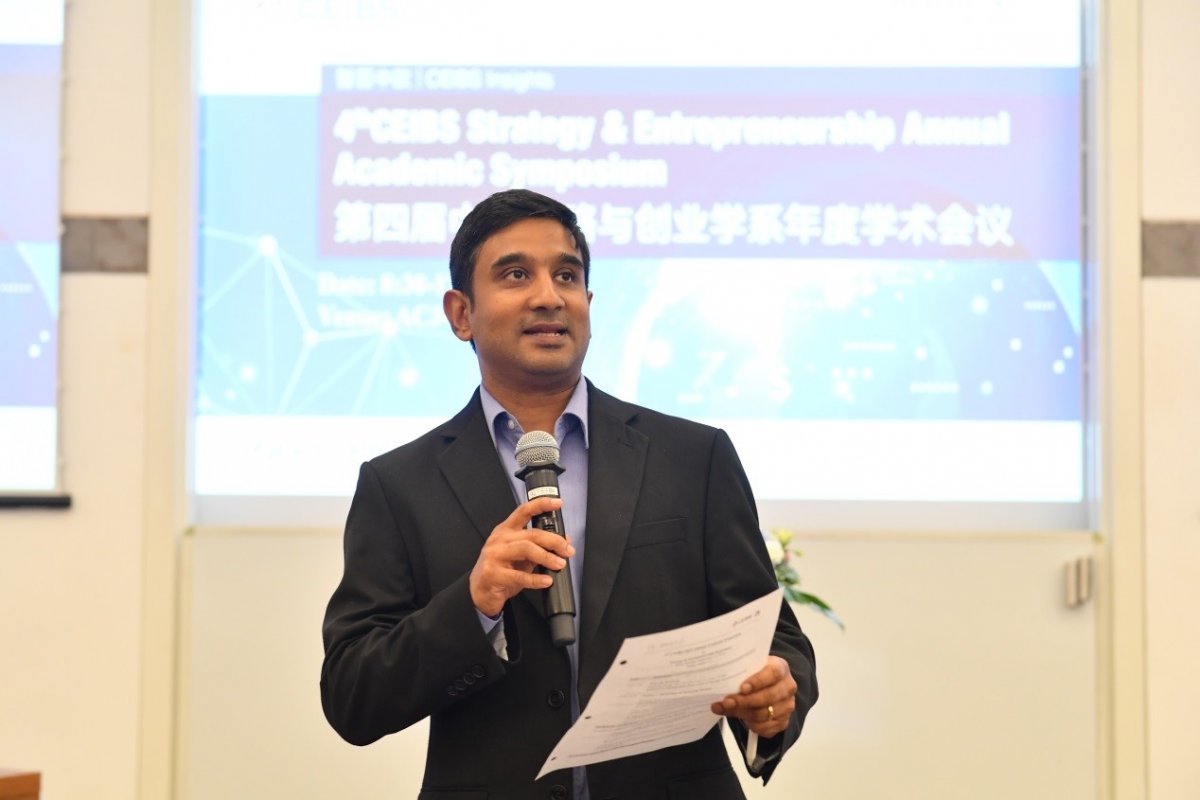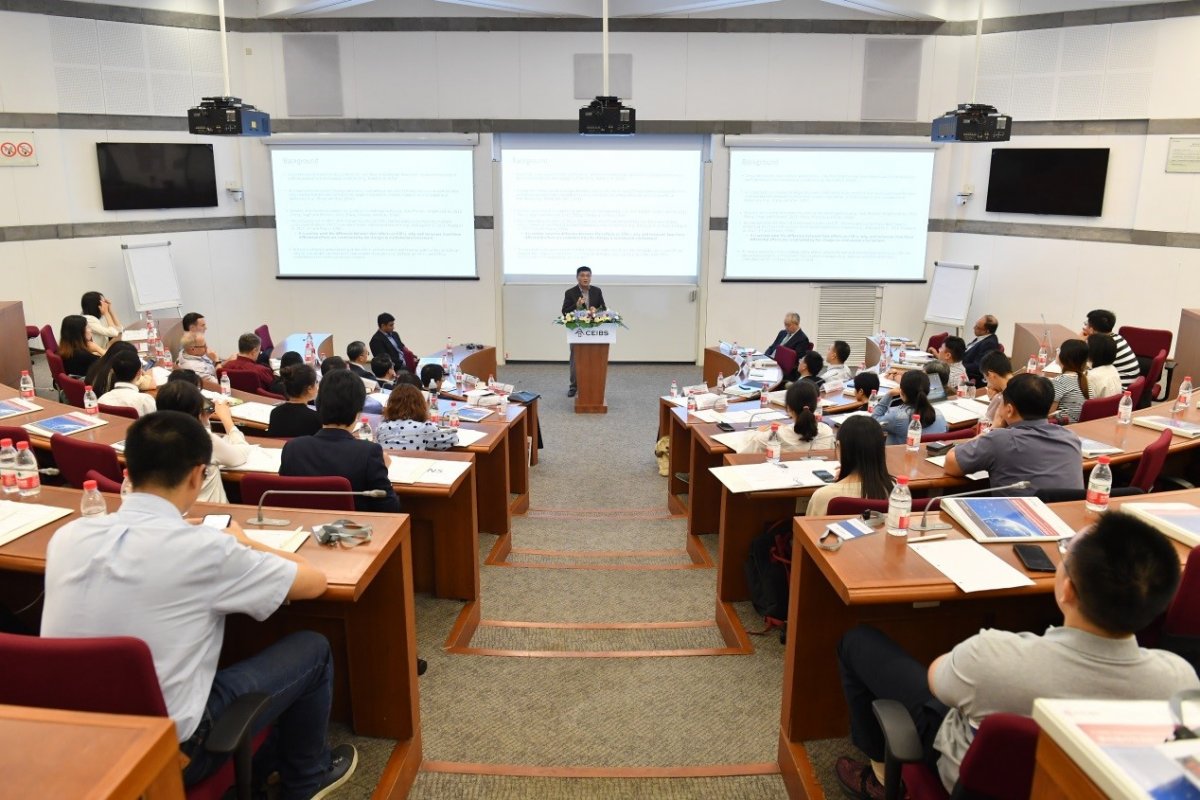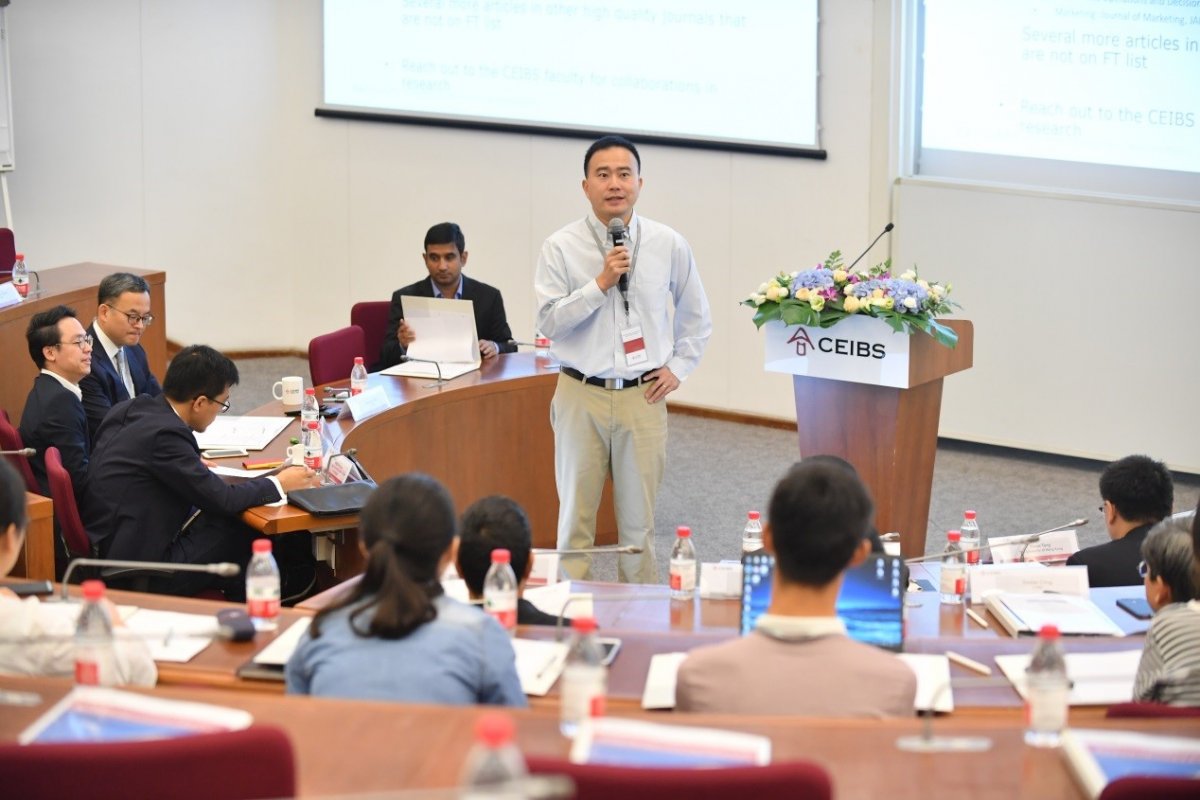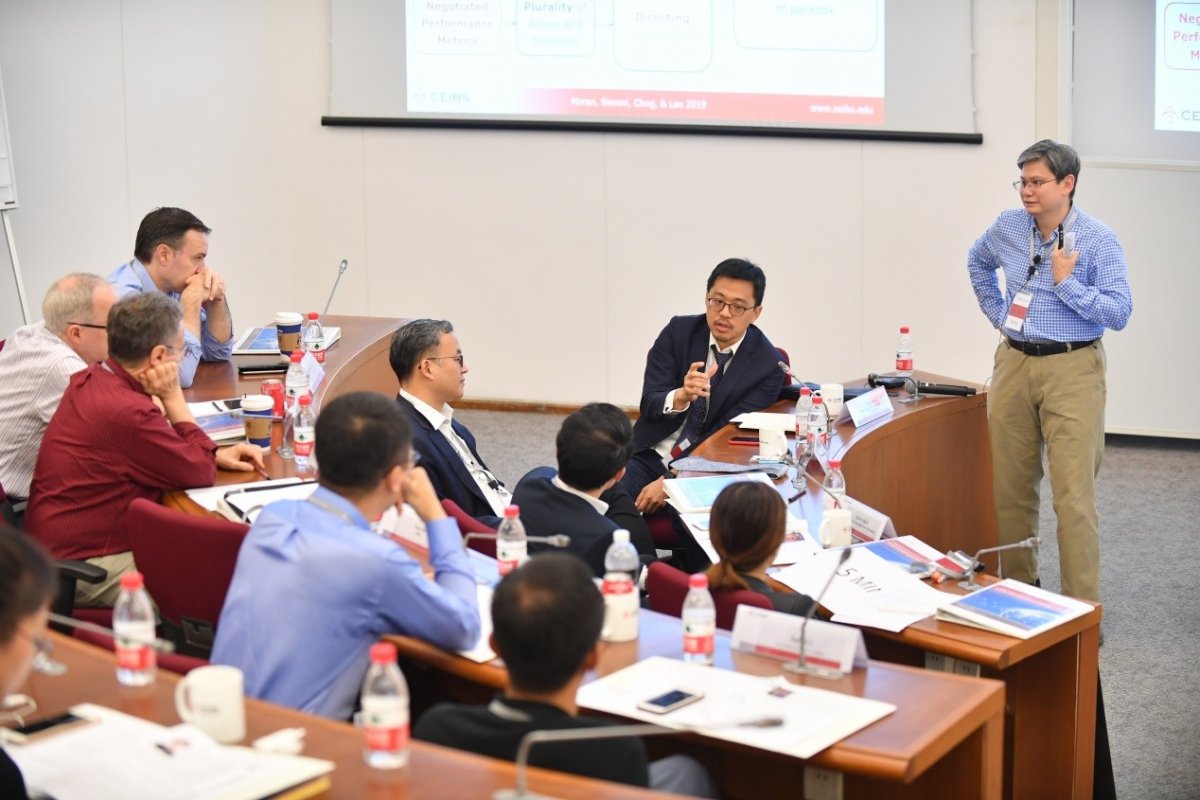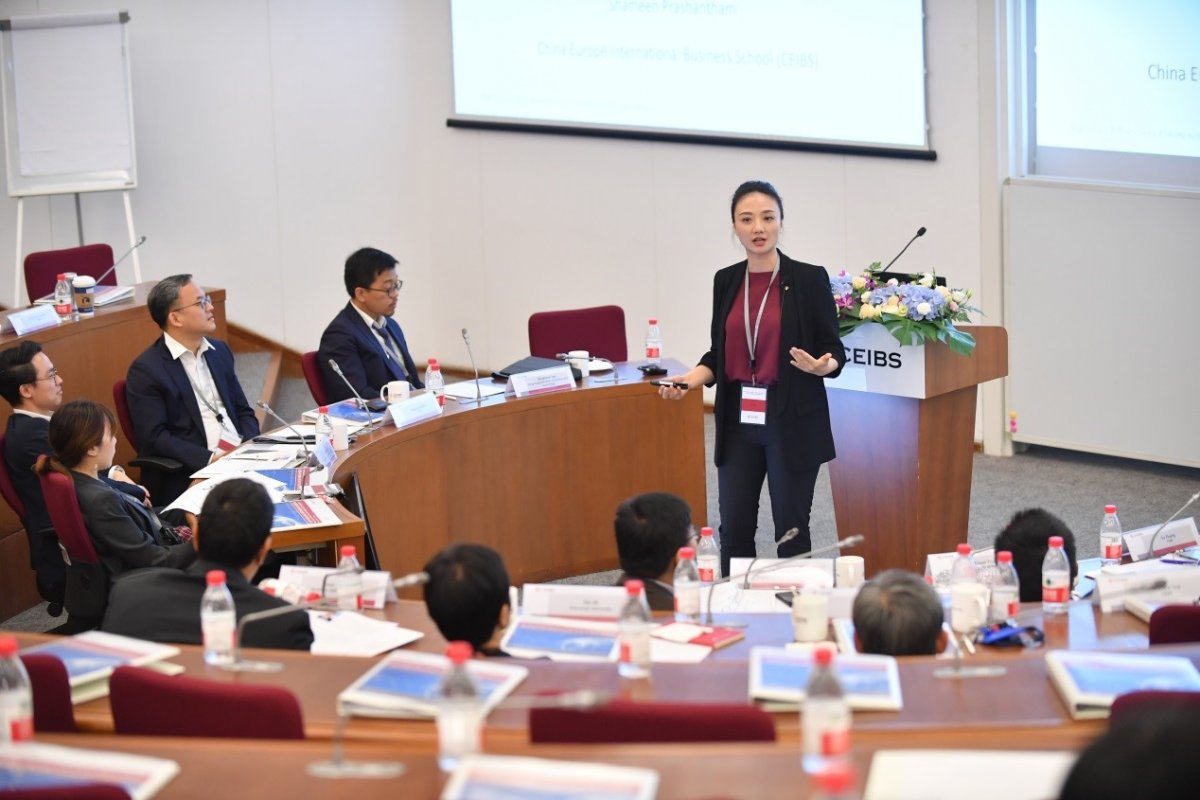S&E Annual Symposium Explores Innovation in Emerging Markets
September 17, 2019. Shanghai – More than 60 scholars from around the world gathered at CEIBS today for a discussion on emerging markets during the 4th CEIBS S&E Annual Symposium. In his opening speech, CEIBS Vice President and Co-Dean Prof. Weijiong Zhang stated that the symposium aims to serve as a platform for scholars to discuss, express their opinions and share their most recent research. He also emphasised that the symposium reflects a growing awareness about the importance of strategic innovation in emerging markets. CEIBS Associate Professor of International Business and Strategy Shameen Prashantham moderated the discussions.
Due to the fast pace of globalisation, emerging markets are now attracting more and more attention, investment and related research worldwide. As start-ups continue to spring up, the trend has brought more opportunities, strengthened connections and broadened co-operation, while increasing profits for enterprises. At the same time, players in emerging markets have faced challenges such as immature regulations, corporate strategic expansion impediments, management barriers and government intervention problems. As a result, entrepreneurs have sought more customer-oriented ways to innovate.
The symposium included a dozen presentations, each followed by a ten-minute Q&A. Session topics included institutions, strategic HRM, social issues and innovation. The following are abstracts from papers presented during the symposium:
The Changing Role of Political Ties in Corporate Social Responsibility during the Anti-corruption Movement in China
Presenter: Xuesong Geng, Associate Professor of Strategic Management from Lee Kong Chian School of Business, Singapore Management University
The anti-corruption movement in China has substantially affected the relationship between firms and the government, but it remains unclear how this change influences these companies’ corporate social responsibility (CSR) behaviour. In our paper, we separate political ties into formal ties and informal ties and examine their changing roles before and after the anti-corruption movement. Specially, we argue that formal ties have become more legitimate, but less binding following the movement, whereas informal ties have become less valuable. As a result, many firms that had relied on informal ties have increased their CSR to gain legitimacy, but firms that had more formal ties have tended to reduce CSR. We examine these relationship empirically in a sample of listed firms between 2010 and 2015 and find consistent results. We also find that this relationship is contingent on several factors like state-ownership, location and R&D intensity. With this changed behaviour amongst different firms, the anti-corruption movement in effect has changed the societal resource allocation and affected the effectiveness of CSR on social welfare.
Technological Cross-Border Acquisitions and MNE Innovation
Presenter: Yinuo Tang, Assistant Professor in Strategy and International Business, Faculty of Business and Economics, The University of Hong Kong
Our paper examines the impact of technological cross-border acquisitions (TCBAs) on the subsequent innovation of the acquirers in their home countries using emerging market multinationals (EMNEs) as an example. Integrating dynamic capabilities theory and the literature of EMNE’s internationalisation, this study proposed an evolutionary path of the EMNEs’ innovative capabilities enhancement resulting from TCBAs. The evolutionary path is demonstrated in two dimensions: on the technological dimension, EMNEs firstly strengthen their exploitative innovation before increasing the exploratory ones; on the geographical dimension, the enhanced innovative capabilities create value in foreign countries before benefit the home countries. We find that characteristics of the target country (i.e., more developed institutions) and the structure of the integration (i.e., acquirers holding majority shares) will lead to a stronger innovation-enhancing effect. This study contributes to the literature of dynamic capability through theorising the process of innovative capability enhancement resulting from TCBAs. Specifically, we illustrate a sequential pattern of exploitation and exploration innovation. The results advance our understanding of the mechanisms driving the upward spiral path in EMNEs’ internationalisation process.
Local Drinking Culture, Government R&D Subsidies and Firm Patenting Behaviour
Presenter: Zhang Yu, Associate Professor of Strategy, Strategy and Entrepreneurship Department, CEIBS
Prior studies on innovation activities in emerging economies have centred on institutional, governance and resource explanations, but few have explored how local culture shapes the way firms obtain innovation resources and produce innovation outputs. We hypothesise that local drinking culture, by influencing the granting of government subsidies on innovation and related firm incentives, may cause low efficiency in innovation in the context of China. We argue that the prevalence of a local drinking culture shapes government officials’ willingness to engage frequently and legitimately in informal networking occasions with firms, and also creates a path dependency for firms to rely on informal networking for gaining information and trust from officials. Hence firms located in regions with heavier drinking culture have higher probability of government approval of R&D subsidies. Nonetheless, firms immersed in a heavier drinking culture will file more patents that are less innovative (i.e., falling into the category of the “utility” as opposed to “inventions”), because the drinking culture promotes hedonism and short-termism, and prioritises relationship-building, reducing firms’ incentives of engaging in true technological innovations. We further show how such effects of the drinking culture vary by regions’ legal developments, firms’ political connections and technological capabilities. This study contributes to innovation literature by providing a culture-based explanation to account for the low efficiency of innovation in one of the largest emerging economies. We also discuss the implications of the impact of culture on business activities and the substitution effect between formal institutions and culture.
Escaping the Survival Trap: Collaboration Networks and the Artistic Career of Freelance Songwriters in the K-Pop Industry
Presenter: Yonghoon Lee, Assistant Professor in the Department of Management, Hong Kong University of Science and Technology
This paper builds on existing research linking network closure to survival and network brokerage to success and investigates when and how actors transition between these two network structures and seek success without jeopardising survival. Using a sample of freelance songwriters in the K-Pop industry, we find that artists who create their first hit release combine efforts to consolidate a core network of trusted parties with moderate broadening of their network to include new distant collaborators. The focus on network broadening increases with the relative deprivation artists experience through the success of their structurally equivalent collaborators, as well as with the extent to which the artist’s current network provides the necessary safety net to venture beyond the familiar neighbourhood.
The Limits of Organisational Involvement in Managing Strategic Change
Presenter: Daniel Mack, Assistant Professor of Strategic Management, Singapore Management University
Extant literature has highlighted the importance of involving organisational members in strategic change to manage it effectively. We conducted a real-time inductive study of a strategy change at an organisation in the hotel industry. Paradoxically, our findings suggest how the involvement of employees unintendedly undermined the implementation of strategy change. While organisational involvement provided frontline employees with greater voice and autonomy, it also instilled greater fear in and constraints on middle managers, who were concerned that their subordinates were misusing and escalating career-damaging issues to top management. Consequently, top management had to spend unnecessary time and effort toward investigating and resolving escalated issues as opposed to improving their organisation’s productivity. Our study contributes to the literature on strategic change by highlighting the limits of involvement practices when organisational members have asymmetric power and incentive structures.
Stay Flexible or Stay Committed: Introduction of a Longitudinal Measure on Employment Stability
Presenter: Changhyun Kim, Assistant Professor of Strategy, China Europe International Business School
Studies of how strategic human resource management (SHRM) affects firm performance have suffered from methodological problems. The retrospective nature of survey measures has been the difficulty of establishing whether observed associations are causal or merely reflect pre-existing differences among firms. This paper develops an objective measure, a firm’s employment elasticity with respect to its sales, to estimate the degree of the firm’s commitment to employees. This unique longitudinal design incorporates data for periods prior to the advent of firm performance. As RBV (Resource-based View) predicts, commitment-based HR shows a positive association with the degree of firm-specificity of knowledge. Moreover, we find a dynamic impact of employment elasticity on firm performance. While a low employment elasticity, indicating high-commitment to employees, shows a detrimental impact on concurrent operational performance, it shows a beneficial impact on future operating performance and firm value. In addition, the positive relationship between high commitment HR and firm value gets stronger when the firm faces a high volatility.
How Do Intermediaries Build Inclusive Markets? The Role of the Social Context and the Actions of Antagonists
Presenter: Israr Qureshi, Professor of School of Management, Australia National University
This article examines intermediaries’ efforts to build inclusive markets. We begin by outlining two prominent approaches to intermediation, which we label the access approach and the social approach. Intermediaries following the access approach focus on solving technical and economic problems and scaling their inclusion efforts quickly. Intermediaries following the social approach pay much more attention to the social dynamics inherent in inclusion efforts and proceed much more slowly as they seek to renegotiate social arrangements. We then ask, ‘How can these approaches best be balanced in practice?’ We explore intermediation efforts in rural India by five intermediaries across five regions. Our analysis focuses on the social dynamics in these regions and the exclusionary strategies employed by antagonists of inclusive markets. We identify resource disparities and interdependence as key drivers of antagonists' strategies, and draw inferences regarding the ideal balance between social and access approaches in a variety of circumstances. Our paper contributes to a growing literature on the role of intermediaries in building inclusive markets by calling attention to the variety of exclusionary strategies employed by antagonists and how intermediaries can best respond.
Channelling and Shielding: The Janus Face of Political Ties in Information Disclosure in an Emerging Market
Presenter: Na Ni, Associate Professor of Management, Shenzhen University
What is the effect of organisations’ political ties on their governance standards? To resolve the mixed findings in prior literature, we propose that two neglected factors explain when political ties advance, or hinder, better governance standards: (1) the source of pressure for governance (state versus market) and (2) the source of organisations’ financing (likewise, state versus market). We focus on mandatory and voluntary information disclosure practices in the context of emerging markets. For mandatory disclosure practices where state pressure is strong, resource dependence created by political ties channels state pressure, restricts organisational discretion, and induces compliance to state mandate. In contrast, for voluntary disclosure practices where state pressure is weak, political ties provide discretion and shield organisations from disclosure. Furthermore, charities’ financial dependence on the state versus the market moderates the effects of political ties on disclosure in different directions. Our investigation of Chinese charitable organisations from 2010 to 2014 provides strong support for our predictions. This study enhances our understanding of the impact of political ties on information disclosure (and more broadly, governance) by demonstrating that political ties restrict organisational discretion around some pressures (i.e. the state) and provide discretion around others (e.g. the market).
The Road Less Travelled: Charting the Course of an Early-stage Social Enterprise
Presenter: Daniel Chng, Associate Professor of Management, China Europe International Business School
Social enterprises (SEs) use market means to address social problems that for-profit firms and the market are unable to solve. These two alternate yet often incompatible goals, of being profitable and solving a complex social problem, force SEs to confront the tensions of an inherent managerial paradox. In this work, we use the dynamic equilibrium model of paradox as an interpretative tool to analyse the approach followed by several Chinese SEs to deal with this paradox. Our study points to three key managerial factors that characterize all three SEs in addressing their managerial paradox. First, our SEs exhibited a clear perception of the inability of conventional approaches to address the targeted social problem. This perception was accompanied by periodic criticism of these alternative approaches that was tempered by a strong commitment to use the market to solve the problem. Second, they imposed specific non-negotiables in interactions with stakeholders and in exploring potential paths forward. Third, they monitored and actively redefined the key performance metrics that would legitimate their sustainability over time. The study contributes to the nascent research stream that describes how managers can use paradox productively.
Digital Innovation in Emerging Economies: Examining the Roles of Dynamisms of Digital Contexts and Diversification Strategies
Presenter: Sali Li, Associate Professor at the Sonoco International Business Department, University of South California
Recently firms in emerging economies have been actively engaged in digital product innovation. Given the economic importance of this nascent sector, there have been frequent shifts in the related regulatory and policy environment, which are having a considerable impact on firms in emerging economies. In examining this important phenomenon, our study builds upon a dynamic institution-based view to investigate how the speed of institutional change affects digital product innovation. We argue that firms tend to reduce digital product innovations when encountering fast institutional changes. Using a sample of 1,533 firms from 20 major emerging economies in the mobile app industry, our empirical results provide support for our main hypothesis. We also argue and find that different diversification strategies may limit or amplify the effect of institutional change speed on digital product innovation, given the implications of diversification for how firms navigate through the changing institutional environment. This study offers important contributions for understanding this timely and prominent innovation phenomenon in emerging economies.
Rapid Expansion and Exit of Exporters at Digital Platforms
Presenter: Ziliang Deng, Professor of International Business and Associate Dean, Renmin University
Internet exporting and cross-border digital platforms have been developing dramatically, which may potentially challenge the internationalisation process model. We hypothesise that the expansion speed of exporters on a cross-border digital platform reduces the exit hazard of exporters. We further incorporate two moderators specific to the digital platforms. We hypothesize that signals on product quality strengthen the main effect of the rapid internet expansion. As for the digital infrastructure development at the target markets, we propose competing hypotheses. To test the hypotheses, we conduct Cox survival analyses based on more than 350,000 transactions on a major digital transaction platform.
Internationalisation of Digital Platforms: Network as an Ownership Advantage and Its Transferability
Presenter: Bai Guo, Lecturer of Strategy, China European International Business School
Digital platform exhibits new ways in internationalisation due to their unique governance structure and value creation mechanisms. One of the key features of digital platforms is that they benefit from the so-called network effect, i.e., enlargement of network size can enhance the value of the network. Some researchers have proposed that such network-based advantage, distinct from traditional asset-based and transaction-based advantages, should be treated as a new type of ownership advantage and merit separate theoretical investigation. In this paper, we propose a comparative framework to examine the transferability of network as a firm-specific advantage (FSA) across geographical borders. Four categories of digital platforms with different patterns and degrees of network transferability are identified. We further examine how such differences would in turn affect platforms’ cost/benefit structure at different stages of internationalisation, and the strategic choices correspondingly.







